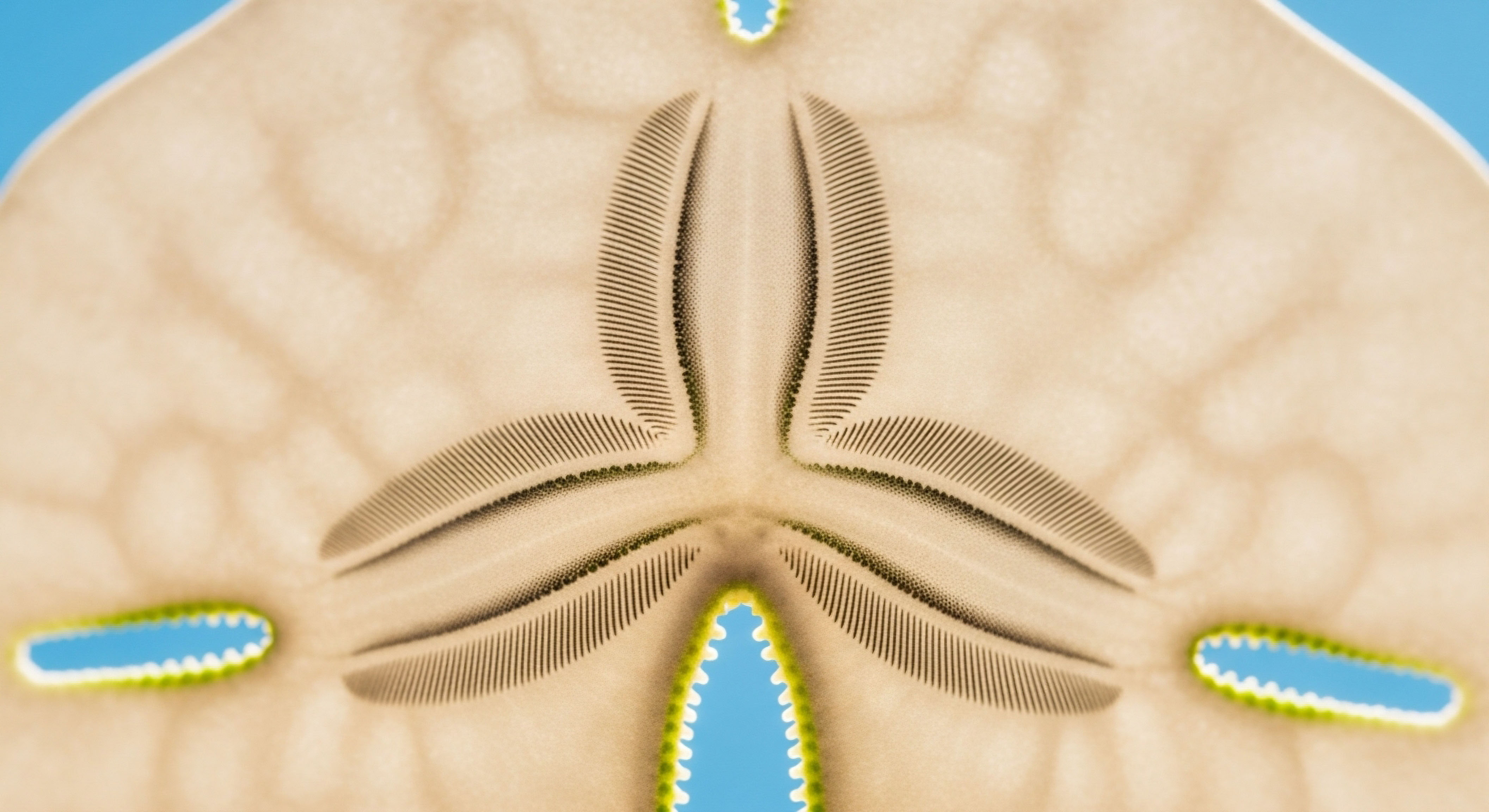

Fundamentals
When you find yourself grappling with a persistent mental fog, a subtle yet unsettling shift in your ability to recall information, or a general dullness that dims your once vibrant cognitive landscape, it is natural to seek explanations. These experiences are not merely subjective feelings; they often signal deeper physiological changes within your body.
Many individuals attribute such changes to the natural progression of time, yet the truth is often more intricate, residing within the delicate balance of your internal messaging system ∞ the endocrine network. Your body communicates through a complex orchestra of chemical messengers, and when these signals become discordant, the impact can extend far beyond physical sensations, reaching directly into the clarity of your thoughts and the sharpness of your memory.
Understanding your biological systems is the first step toward reclaiming vitality and function. The endocrine system, a network of glands and organs, produces and releases hormones that regulate nearly every process in your body. These hormones act as vital couriers, transmitting instructions that influence everything from your mood and energy levels to your metabolism and, significantly, your cognitive abilities.
When this system operates optimally, you experience mental acuity, emotional stability, and physical resilience. Conversely, imbalances can manifest as the very symptoms that prompt your search for answers.
Cognitive shifts, such as mental fog or memory challenges, frequently stem from imbalances within the body’s intricate endocrine messaging system.
The concept of endocrine recalibration involves a precise, evidence-based approach to restoring hormonal equilibrium. This is not about simply replacing what is missing; it is about fine-tuning your body’s inherent mechanisms to function at their best. This process acknowledges that each individual’s biological blueprint is unique, necessitating a personalized strategy to address specific hormonal deficiencies or excesses. The goal is to optimize the physiological environment, allowing your brain to operate with renewed vigor and clarity.

The Body’s Internal Messaging System
Hormones are chemical substances secreted by endocrine glands directly into the bloodstream. They travel to target cells or organs, where they exert specific effects. Consider them as the body’s internal messaging service, delivering precise instructions that govern growth, metabolism, reproduction, and even cognitive processes. The pituitary gland, often called the “master gland,” orchestrates many of these hormonal communications, responding to signals from the hypothalamus in the brain and, in turn, regulating other glands like the thyroid, adrenals, and gonads.
When we discuss cognitive responses to endocrine recalibration, we are exploring how adjustments to these hormonal messages can influence brain function. The brain itself is a highly responsive organ, replete with receptors for various hormones. Changes in hormone levels, whether due to aging, stress, environmental factors, or specific health conditions, can directly influence neuronal health, neurotransmitter synthesis, and synaptic plasticity ∞ all fundamental to memory, attention, and executive function.

Why Hormonal Balance Matters for Cognition
The connection between hormonal health and cognitive function Meaning ∞ Cognitive function refers to the mental processes that enable an individual to acquire, process, store, and utilize information. is undeniable. For instance, thyroid hormones are essential for brain development and function, with both hypothyroidism and hyperthyroidism capable of causing cognitive impairments. Similarly, cortisol, a stress hormone, can have both acute and chronic effects on memory and learning, depending on its levels and duration of elevation. Sex hormones, such as testosterone and estrogens, also play significant roles in maintaining brain health across the lifespan.
Recognizing the symptoms of hormonal imbalance is the first step toward addressing them. These symptoms can be subtle, often dismissed as typical signs of aging or stress. They might include ∞
- Persistent fatigue, even after adequate rest.
- Difficulty concentrating or maintaining focus.
- Memory lapses, particularly with recent events or names.
- Mood fluctuations, including increased irritability or feelings of sadness.
- Reduced mental stamina, leading to quick burnout during mentally demanding tasks.
Addressing these concerns requires a comprehensive assessment of your endocrine profile, moving beyond a superficial glance at individual hormone levels to understand their interplay and impact on your overall well-being.


Intermediate
Embarking on a path of endocrine recalibration Meaning ∞ Endocrine Recalibration refers to the clinical process of restoring optimal functional balance within the body’s hormonal system. involves understanding the specific clinical protocols designed to restore hormonal balance and, by extension, support cognitive vitality. These therapies are not one-size-fits-all solutions; they are tailored interventions, precisely administered to address individual physiological needs. The aim is to optimize the body’s internal environment, allowing its systems to operate with greater efficiency and harmony.
The science behind these protocols centers on the principle of restoring physiological levels of hormones that may have declined due to age, stress, or other factors. This restoration can have widespread effects, influencing not only physical well-being but also the intricate neural pathways that govern thought, memory, and emotional regulation. When considering these interventions, it is vital to grasp both the ‘how’ and the ‘why’ of their application.

Testosterone Optimization Protocols for Men
For men experiencing symptoms associated with declining testosterone levels, often referred to as andropause or late-onset hypogonadism, testosterone replacement therapy (TRT) can be a transformative intervention. Symptoms such as diminished energy, reduced libido, changes in body composition, and noticeable shifts in cognitive function, including reduced mental clarity, often prompt consideration of TRT. The protocol typically involves weekly intramuscular injections of Testosterone Cypionate, a long-acting form of testosterone, at a concentration of 200mg/ml.
A comprehensive TRT protocol extends beyond mere testosterone administration. It frequently incorporates adjunctive medications to maintain the delicate balance of the endocrine system and mitigate potential side effects.
- Gonadorelin ∞ Administered via subcutaneous injections, typically twice weekly, Gonadorelin helps to stimulate the body’s natural production of luteinizing hormone (LH) and follicle-stimulating hormone (FSH).
This supports endogenous testosterone production and preserves testicular function, including fertility.
- Anastrozole ∞ This oral tablet, also often taken twice weekly, acts as an aromatase inhibitor. Aromatase is an enzyme that converts testosterone into estrogen.
By blocking this conversion, Anastrozole helps to manage estrogen levels, preventing potential side effects such as gynecomastia or water retention that can arise from elevated estrogen.
- Enclomiphene ∞ In some cases, Enclomiphene may be included.
This selective estrogen receptor modulator (SERM) works by blocking estrogen receptors in the hypothalamus and pituitary gland, thereby signaling the body to produce more LH and FSH, which in turn stimulates natural testosterone synthesis.
The precise combination and dosage of these agents are determined by individual laboratory values, symptom presentation, and clinical response, ensuring a personalized approach to hormonal optimization.
Testosterone replacement therapy for men extends beyond simple hormone administration, often including agents like Gonadorelin and Anastrozole to maintain systemic balance and mitigate side effects.

Hormonal Balance for Women
Women, particularly those navigating the perimenopausal and postmenopausal transitions, also experience significant hormonal shifts that can impact cognitive function. Symptoms like irregular menstrual cycles, hot flashes, sleep disturbances, mood changes, and a decline in cognitive sharpness are common. Hormonal optimization Meaning ∞ Hormonal Optimization is a clinical strategy for achieving physiological balance and optimal function within an individual’s endocrine system, extending beyond mere reference range normalcy. protocols for women aim to restore physiological levels of estrogens and progesterone, and in some cases, low-dose testosterone.
Protocols for women are highly individualized ∞
- Testosterone Cypionate ∞ Administered weekly via subcutaneous injection, typically in very low doses (e.g. 10 ∞ 20 units or 0.1 ∞ 0.2ml). This addresses symptoms such as low libido, fatigue, and cognitive dullness, which can be associated with insufficient testosterone levels in women.
- Progesterone ∞ Prescribed based on menopausal status and individual needs, progesterone plays a vital role in balancing estrogen, supporting sleep, and influencing mood and cognitive processes.
- Pellet Therapy ∞ Long-acting testosterone pellets can offer a consistent delivery method, often combined with Anastrozole when appropriate to manage estrogen conversion.
This approach provides sustained hormonal support, reducing the frequency of administration.
These interventions aim to alleviate symptoms and support overall well-being, including cognitive health, by re-establishing a more balanced hormonal environment.

Post-TRT or Fertility-Stimulating Protocols for Men
For men who have discontinued TRT or are seeking to restore fertility, specific protocols are employed to reactivate the body’s natural hormone production. TRT can suppress the hypothalamic-pituitary-gonadal (HPG) axis, leading to reduced endogenous testosterone production Lifestyle interventions can significantly support the body’s natural testosterone production, complementing therapeutic protocols for optimal vitality. and impaired sperm genesis. The goal of these protocols is to stimulate the testes to resume their natural function.
A typical protocol includes ∞
- Gonadorelin ∞ Continues to stimulate LH and FSH release, prompting the testes to produce testosterone and sperm.
- Tamoxifen ∞ A selective estrogen receptor modulator (SERM) that blocks estrogen’s negative feedback on the pituitary, thereby increasing LH and FSH secretion.
- Clomid (Clomiphene Citrate) ∞ Another SERM that works similarly to Tamoxifen, stimulating gonadotropin release and, consequently, endogenous testosterone production.
- Anastrozole ∞ May be optionally included to manage estrogen levels during the recovery phase, especially if a rebound in estrogen occurs as testosterone production increases.
This strategic combination helps to normalize the HPG axis, supporting both hormonal recovery and fertility.

Growth Hormone Peptide Therapy
Growth hormone Meaning ∞ Growth hormone, or somatotropin, is a peptide hormone synthesized by the anterior pituitary gland, essential for stimulating cellular reproduction, regeneration, and somatic growth. (GH) and its stimulating peptides are increasingly recognized for their roles in anti-aging, metabolic regulation, and cognitive support. These peptides work by stimulating the pituitary gland to produce and release more natural GH, avoiding the direct administration of synthetic GH. This approach aims to restore youthful levels of GH, which decline with age, influencing muscle mass, fat metabolism, skin integrity, and brain function.
Key peptides in this category include ∞
- Sermorelin ∞ A growth hormone-releasing hormone (GHRH) analog that stimulates the pituitary to secrete GH.
- Ipamorelin / CJC-1295 ∞ These are GH secretagogues that work synergistically with Sermorelin to amplify GH release.
Ipamorelin is known for its selective GH release without significantly affecting other hormones like cortisol.
- Tesamorelin ∞ A GHRH analog approved for reducing visceral fat, also showing promise in cognitive areas.
- Hexarelin ∞ Another potent GH secretagogue, often used for its muscle-building and recovery properties.
- MK-677 (Ibutamoren) ∞ An oral GH secretagogue that increases GH and IGF-1 levels.
These peptides are often utilized by active adults and athletes seeking benefits such as improved body composition, enhanced recovery, better sleep quality, and potential cognitive improvements, including mental clarity and memory support.

Other Targeted Peptides
Beyond growth hormone secretagogues, other peptides offer targeted benefits, including those relevant to cognitive and overall physiological function.
- PT-141 (Bremelanotide) ∞ This peptide acts on melanocortin receptors in the brain to address sexual dysfunction in both men and women, influencing desire and arousal through central nervous system pathways.
- Pentadeca Arginate (PDA) ∞ A peptide with properties that support tissue repair, accelerate healing processes, and reduce inflammation.
Its systemic anti-inflammatory effects can indirectly benefit cognitive function by reducing neuroinflammation, a factor in cognitive decline.
These peptides exemplify the precision of modern biochemical recalibration, targeting specific physiological pathways to restore function and enhance well-being.
The table below summarizes the primary applications and mechanisms of these core clinical protocols.
| Protocol | Primary Target Audience | Key Agents | Mechanism of Action |
|---|---|---|---|
| Testosterone Optimization (Men) | Middle-aged to older men with low testosterone symptoms | Testosterone Cypionate, Gonadorelin, Anastrozole, Enclomiphene | Restores testosterone levels, supports endogenous production, manages estrogen conversion. |
| Hormonal Balance (Women) | Pre/peri/post-menopausal women with hormonal symptoms | Testosterone Cypionate (low dose), Progesterone, Estrogen (various forms), Pellet Therapy | Optimizes sex hormone levels, addresses symptoms like low libido, mood changes, cognitive shifts. |
| Post-TRT/Fertility (Men) | Men discontinuing TRT or seeking fertility restoration | Gonadorelin, Tamoxifen, Clomid, Anastrozole (optional) | Reactivates natural HPG axis function, stimulates endogenous testosterone and sperm production. |
| Growth Hormone Peptide Therapy | Active adults, athletes seeking anti-aging, metabolic, cognitive benefits | Sermorelin, Ipamorelin/CJC-1295, Tesamorelin, Hexarelin, MK-677 | Stimulates natural growth hormone release from the pituitary, influencing body composition, recovery, cognition. |
| Other Targeted Peptides | Individuals with specific needs (sexual health, tissue repair) | PT-141, Pentadeca Arginate (PDA) | Acts on specific neural pathways for sexual function; reduces inflammation and supports healing. |


Academic
The question of whether specific biomarkers predict cognitive responses to endocrine recalibration is a central inquiry in personalized wellness. While the subjective experience of improved mental clarity Meaning ∞ Mental clarity describes optimal cognitive function, marked by sharp focus, efficient information processing, and an absence of mental fogginess or confusion. or memory is invaluable, identifying measurable biological indicators provides a deeper understanding of the underlying mechanisms and allows for more precise, data-driven interventions. This exploration requires a sophisticated understanding of endocrinology, neurobiology, and the intricate interplay between various physiological systems.
Cognitive function is not a monolithic entity; it encompasses various domains, including memory, attention, executive function, and processing speed. Hormones influence these domains through diverse pathways, affecting neuronal survival, synaptic plasticity, neurotransmitter systems, and cerebral blood flow. Predicting an individual’s cognitive response to hormonal intervention involves assessing a spectrum of biomarkers that reflect these complex interactions.

What Hormonal Biomarkers Signal Cognitive Potential?
The most direct biomarkers for predicting cognitive responses Your genetic code, particularly in the androgen receptor, dictates your unique sensitivity and response to testosterone therapy. to endocrine recalibration are, naturally, the hormones themselves. However, it is not simply the absolute level of a hormone that matters, but its bioavailability, its ratio to other hormones, and the sensitivity of its receptors in target tissues, particularly the brain.
- Testosterone and Estradiol ∞ In men, optimizing free and total testosterone levels can influence spatial memory and verbal fluency. Research indicates that low testosterone levels are associated with increased inflammatory markers and impaired cerebrovascular function, both contributing to cognitive impairment. For women, the timing of estrogen therapy initiation appears critical. Early intervention, closer to the menopausal transition, may yield more favorable cognitive outcomes, particularly in verbal memory, compared to late initiation. The APOE-ε4 allele, a genetic risk factor for Alzheimer’s disease, significantly modulates these responses, with some studies suggesting that hormone therapy may have beneficial effects on cognitive trajectories among homozygous carriers.
- Progesterone ∞ Beyond its reproductive roles, progesterone and its neurosteroid metabolites, such as allopregnanolone, exert direct effects on brain function, influencing mood, sleep, and memory. Monitoring progesterone levels, especially in conjunction with estrogen, is essential for female hormonal balance and its cognitive implications.
- Thyroid Hormones (TSH, Free T3, Free T4) ∞ Thyroid dysfunction, even subclinical, can profoundly affect cognition, leading to symptoms like brain fog, slowed thinking, and memory difficulties. Optimal thyroid function is a prerequisite for robust cognitive performance, and recalibrating these levels is a foundational step in addressing cognitive concerns.
- DHEA-S (Dehydroepiandrosterone Sulfate) ∞ This adrenal hormone is a precursor to both androgens and estrogens and declines with age. It has neuroprotective properties and influences neurotransmitter systems, making its levels a relevant biomarker for overall neuroendocrine health and cognitive resilience.

Can Neurotrophic Factors Predict Cognitive Shifts?
Neurotrophic factors Meaning ∞ Neurotrophic factors are a family of proteins supporting the survival, growth, and differentiation of developing neurons, also maintaining mature neuronal function. are proteins that support the survival, development, and function of neurons. Their levels can serve as indicators of neuronal health and plasticity, offering insights into the brain’s capacity to respond to hormonal changes.
- Brain-Derived Neurotrophic Factor (BDNF) ∞ BDNF is a key mediator of synaptic plasticity, learning, and memory. Hormones like estrogen and testosterone can influence BDNF expression. Higher BDNF levels are generally associated with better cognitive function and resilience to neurodegeneration. Changes in BDNF following endocrine recalibration could predict improvements in cognitive domains.
- Insulin-like Growth Factor 1 (IGF-1) ∞ Produced primarily in the liver in response to growth hormone, IGF-1 also has direct effects on brain health, promoting neurogenesis, neuronal survival, and synaptic function. Age-related declines in growth hormone-releasing hormone (GHRH) and IGF-1 are linked to cognitive changes. Interventions with growth hormone-stimulating peptides aim to increase IGF-1, and monitoring this biomarker can help predict cognitive improvements, particularly in mild cognitive impairment.

Do Inflammatory Markers Influence Cognitive Outcomes?
Chronic low-grade inflammation is increasingly recognized as a significant contributor to cognitive decline Meaning ∞ Cognitive decline signifies a measurable reduction in cognitive abilities like memory, thinking, language, and judgment, moving beyond typical age-related changes. and neurodegenerative diseases. Inflammatory markers Meaning ∞ Inflammatory markers are biochemical substances whose concentrations in bodily fluids change in response to tissue injury, infection, or physiological stress. can cross the blood-brain barrier, leading to neuroinflammation that disrupts neuronal function and synaptic integrity.
- C-Reactive Protein (CRP) ∞ A general marker of systemic inflammation. Elevated CRP levels are associated with an increased risk of cognitive impairment and dementia.
- Interleukin-6 (IL-6) and Tumor Necrosis Factor-alpha (TNF-α) ∞ These pro-inflammatory cytokines are implicated in neuroinflammation. Studies show a significant association between elevated IL-6 and TNF-α levels and cognitive impairment, particularly in conditions like Type 2 Diabetes Mellitus. Reducing these inflammatory markers through hormonal optimization or other interventions could predict positive cognitive responses.
The interplay between metabolic health, inflammation, and cognitive function is particularly relevant. Hormonal imbalances can contribute to metabolic dysregulation, which in turn fuels inflammation, creating a detrimental cycle for brain health.

Are Genetic Markers Relevant for Predicting Cognitive Responses?
Genetic predispositions can significantly influence an individual’s response to endocrine recalibration, particularly concerning cognitive outcomes.
- APOE-ε4 Allele ∞ This genetic variant is the strongest genetic risk factor for late-onset Alzheimer’s disease. Its presence can modify the cognitive response to hormone therapy, especially estrogen. For instance, some research suggests that menopausal hormone therapy may have beneficial effects on cognitive trajectories among APOE-ε4 homozygotes, particularly when initiated earlier. This highlights the importance of considering genetic profiles in personalized treatment strategies.
- COMT-Val/Met Polymorphism ∞ The Catechol-O-methyltransferase (COMT) enzyme is involved in the degradation of neurotransmitters like dopamine. Polymorphisms in the COMT gene can influence executive function and working memory, and their interaction with hormonal status is an area of ongoing research.

Can Synaptic Biomarkers Offer Predictive Insights?
Synaptic health is fundamental to cognitive function. Biomarkers reflecting synaptic integrity and function can provide direct insights into the brain’s response to interventions.
- Neuronal Exosome Biomarkers ∞ Neuronally-derived exosomes (NDEs) are tiny vesicles released by neurons that contain proteins reflecting the state of the parent cell. Proteins like neurogranin (NRGN), synaptophysin, synaptotagmin, and synaptopodin, found within NDEs, are indicative of synaptic health. Changes in their plasma concentrations can distinguish individuals with mild cognitive impairment from cognitively normal adults. While direct modulation by GHRH treatment on these specific markers is still being explored, their diagnostic accuracy for cognitive status suggests their potential as predictive biomarkers for cognitive responses to broader endocrine recalibration.
The table below provides a summary of key biomarkers and their potential role in predicting cognitive responses to endocrine recalibration.
| Biomarker Category | Specific Biomarkers | Cognitive Association / Predictive Role |
|---|---|---|
| Hormone Levels | Free Testosterone, Estradiol, Progesterone, TSH, Free T3, Free T4, DHEA-S | Directly influence neuronal health, neurotransmitter systems, and cerebral blood flow. Optimal levels correlate with improved memory, attention, and executive function. |
| Neurotrophic Factors | BDNF, IGF-1 | Support neuronal survival, neurogenesis, and synaptic plasticity. Increases often predict enhanced learning, memory, and cognitive resilience. |
| Inflammatory Markers | CRP, IL-6, TNF-α | Elevated levels indicate neuroinflammation, which can impair cognitive function. Reduction often correlates with cognitive improvement. |
| Genetic Markers | APOE-ε4 allele, COMT-Val/Met polymorphism | Modulate individual susceptibility and response to hormonal interventions, influencing cognitive outcomes and neurodegenerative risk. |
| Synaptic Biomarkers | Neurogranin, Synaptophysin, Synaptotagmin, Synaptopodin (in NDEs) | Reflect synaptic integrity and function. Changes can indicate neuronal health and predict cognitive status or response to neuro-modulatory therapies. |

How Does Endocrine Recalibration Influence Brain Metabolism?
Beyond direct hormonal effects, endocrine recalibration can profoundly influence brain metabolism, which is a critical determinant of cognitive function. The brain is a highly metabolically active organ, relying heavily on a consistent supply of glucose and oxygen. Hormones play a significant role in regulating metabolic pathways that support brain energy.
For instance, insulin sensitivity, often influenced by sex hormones and growth hormone, directly impacts glucose uptake and utilization by brain cells. Dysregulation in insulin signaling within the brain is linked to cognitive decline and neurodegenerative processes. Similarly, lipid metabolism, influenced by thyroid hormones and sex steroids, affects the composition of neuronal membranes and the synthesis of neurosteroids, which are crucial for synaptic function.
Monitoring metabolic markers such as HbA1c, fasting glucose, insulin levels, and lipid profiles can provide indirect but significant predictive insights into potential cognitive improvements following endocrine recalibration. A reduction in systemic inflammation, often a consequence of improved metabolic health, further supports a healthier brain environment.

Can Cognitive Responses Be Predicted by Timing of Intervention?
The concept of a “critical window” for hormonal intervention, particularly with estrogen therapy Meaning ∞ Estrogen therapy involves the controlled administration of estrogenic hormones to individuals, primarily to supplement or replace endogenous estrogen levels. in women, suggests that the timing of endocrine recalibration can significantly influence cognitive outcomes. Initiating hormone therapy closer to the onset of menopause, rather than many years later, appears to be associated with more favorable cognitive trajectories and potentially reduced risk of neurodegenerative conditions.
This phenomenon underscores the importance of proactive, rather than reactive, approaches to hormonal health. The brain’s responsiveness to hormonal signals may diminish over time if a prolonged period of deficiency has occurred, highlighting the need for timely assessment and intervention.
Predicting cognitive responses to endocrine recalibration is a dynamic process that integrates various biological signals. It moves beyond a simple measurement of hormone levels Meaning ∞ Hormone levels refer to the quantifiable concentrations of specific hormones circulating within the body’s biological fluids, primarily blood, reflecting the dynamic output of endocrine glands and tissues responsible for their synthesis and secretion. to consider genetic predispositions, inflammatory status, metabolic health, and the integrity of synaptic connections. This comprehensive approach allows for a more precise and personalized strategy, maximizing the potential for individuals to reclaim their cognitive vitality.

References
- Saleh, A. et al. “Hormone replacement therapy, menopausal age and lifestyle variables are associated with better cognitive performance at follow-up but not cognition over time in older-adult women irrespective of APOE4 carrier status and co-morbidities.” Frontiers in Aging Neuroscience, vol. 16, 2025.
- Baker, L. D. et al. “Growth Hormone-Releasing Hormone Modulation of Neuronal Exosome Biomarkers in Mild Cognitive Impairment.” Journal of Alzheimer’s Disease, vol. 68, no. 4, 2019, pp. 1631-1644.
- Marioni, R. E. et al. “Peripheral Inflammation and Cognitive Performance in Middle-Aged Adults With and Without Type 2 Diabetes.” Frontiers in Aging Neuroscience, vol. 12, 2020, Article 605878.
- Safai Haeri, N. et al. “Association of Inflammatory Markers with Muscle and Cognitive Function.” Journal of Health, Nutrition, and Aging, 2024.
- Maki, P. M. & Henderson, V. W. “Estrogen Effects on Cognitive and Synaptic Health Over the Lifecourse.” Physiological Reviews, vol. 96, no. 2, 2016, pp. 1105-1142.
- Cherrier, M. M. et al. “Testosterone supplementation improves verbal memory in older hypogonadal men.” Journal of Clinical Endocrinology & Metabolism, vol. 90, no. 5, 2005, pp. 2660-2668.
- Wang, L. et al. “The Role of Inflammatory Markers in Linking Metabolic Syndrome to Cognitive Decline in Middle-Aged Women ∞ A Focus on TNF-α and IL-6.” International Journal of Molecular Sciences, vol. 26, no. 6, 2025, Article 2491.
- Coughlan, G. et al. “Menopausal hormone therapy has beneficial effects on cognitive trajectories among homozygous carriers of the APOE-ε4 allele.” Alzheimer’s & Dementia ∞ The Journal of the Alzheimer’s Association, vol. 19, no. 1, 2023, pp. 112-123.
- Wellcome Leap Program CARE ∞ Cutting Alzheimer’s Risk through Endocrinology. Program Overview, 2023.
- Dyer, A. H. et al. “Correlation between inflammatory biomarkers, cognitive function and glycemic and lipid profiles in patients with type 2 diabetes mellitus ∞ A systematic review and meta-analysis.” Clinical Biochemistry, vol. 111, 2023, Article 110683.

Reflection
As you consider the intricate connections between your hormonal landscape and your cognitive vitality, reflect on your own experiences. Have you noticed subtle shifts in your mental acuity, your ability to focus, or the ease with which you recall information? These observations are not mere anecdotes; they are valuable signals from your biological systems, inviting a deeper inquiry.
The knowledge presented here, detailing the specific biomarkers and the mechanisms of endocrine recalibration, is not an endpoint. It is a starting point, a framework for understanding the profound potential within your own physiology.
Your personal health journey is unique, shaped by your genetics, lifestyle, and individual responses to the world around you. The path to reclaiming cognitive function and overall well-being is often a collaborative one, guided by a comprehensive assessment of your unique biological profile. Consider how this understanding might empower you to engage more actively in your health decisions, moving toward a future where mental clarity and vitality are not just aspirations, but lived realities.



















